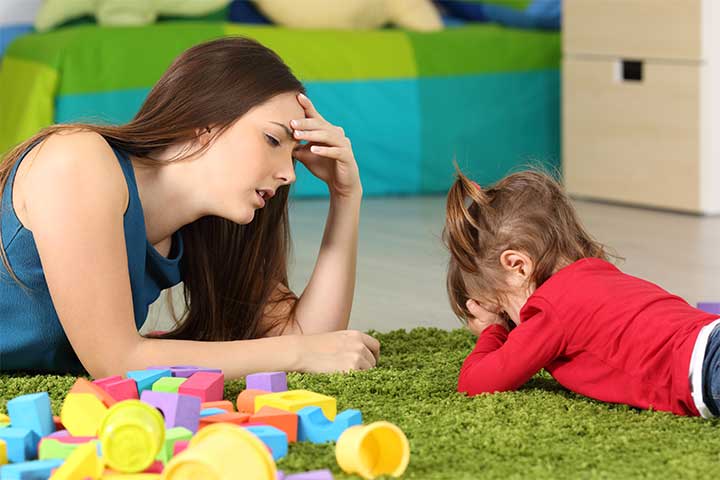
Image: Shutterstock
As a parent, you embark on a transformative journey filled with boundless joy, milestones, and, at times, unexpected challenges. One such challenge that often surfaces during the toddler years is parental anxiety. These precious years are marked by rapid growth, exploration, and the emergence of independence. Yet, they can also bring forth anxieties and fears that leave you wondering how to navigate this delicate phase. In this article, we delve into the realm of parental anxiety during the toddler years, offering insights, strategies, and a comforting reminder that you’re not alone on this path. Read on to know more!
What Happens During The Toddler Stage?
The toddler stage is a remarkable period marked by your child’s rapid physical, cognitive, and emotional development. As your little one starts to explore the world around them, they’re also forming their identity and discovering their preferences. This newfound independence can sometimes trigger parental anxiety. It’s during this stage that you witness the emergence of your child’s unique personality, complete with quirks and traits that might diverge from your expectations.
What Are Common Anxieties And Fears?
Image: Shutterstock
Parental anxiety during the toddler years often arises from a multitude of concerns:
1. Safety
As your toddler ventures into exploring their environment, concerns about safety can be overwhelming. You find yourself constantly assessing potential hazards and worrying about accidents. From sharp corners to electrical outlets, your home becomes a landscape of potential risks.
2. Health And Well-Being
Toddlers are notorious for their curiosity and tendency to put objects in their mouths. This natural exploration can ignite health-related fears about allergies, choking hazards, or exposure to germs. Every new food or object they encounter triggers a mental checklist of potential dangers.
3. Developmental Milestones
The comparison game can be a significant source of anxiety. Observing other children reaching milestones faster can fuel worry that your child might be lagging behind in certain areas. Milestones like walking, talking, or potty training become markers of success, inadvertently inviting comparison and self-doubt.
4. Separation Anxiety
As your toddler takes the first steps towards independence, they may also experience bouts of separation anxiety. The tears at drop-off, clinginess, and the fear of being left behind can be heart-wrenching. For you, it triggers feelings of guilt and a struggle to balance their need for independence with their emotional security.
5. Social Interactions
Navigating the realm of playdates and social interactions can introduce a whole new set of concerns. You may worry about your child’s ability to make friends, interact appropriately, or fit in with their peers. This apprehension can extend to parties, group activities, and the inevitable dynamics of childhood friendships.
6. Sleep Concerns
Toddler sleep patterns can be erratic, leading to sleep-related anxieties. From bedtime battles to night wakings, sleep becomes a focal point of concern, impacting both your child’s and your own well-being.
7. Feeding Challenges
As toddlers transition to solid foods, feeding challenges can trigger anxiety. Picky eating, mealtime battles, and worries about nutritional intake can become significant stressors.
Why Is It Important To Deal With Anxiety?
Image: Shutterstock
Dealing with parental anxiety is not only essential for your well-being but also profoundly impacts your child’s emotional development. Toddlers are remarkably perceptive and attuned to their caregivers’ emotions. When you’re anxious, your child can pick up on your distress, potentially leading to their own feelings of unease. Addressing your anxiety not only benefits you but creates a more emotionally secure environment for your toddler to explore and learn.
How Can I Manage My Anxiety?
1. Stay Informed
Educate yourself about typical toddler development. Knowing what to expect at each stage can help alleviate unnecessary worries.
2. Limit Exposure
While it’s essential to stay informed, avoid overloading yourself with information that might trigger anxiety. Choose reliable sources and set healthy boundaries.
3. Trust Your Instincts
Remember, you know your child best. Trust your instincts and your ability to make decisions that suit your child’s unique needs.
4. Seek Support
Reach out to fellow parents, friends, or support groups. Sharing experiences and concerns can offer validation and practical advice.
5. Mindfulness And Self-Care
Incorporate mindfulness practices and self-care into your routine. Engaging in activities that bring you joy and relaxation can help manage anxiety.
6. Communication
Openly discuss your concerns with your partner, a trusted friend, or a mental health professional. Sometimes, voicing your worries can provide relief.
7. Celebrate Small Wins
Recognize and celebrate your child’s achievements, no matter how minor. This positive focus can alleviate anxiety about developmental milestones.
The toddler years are a time of wonder, exploration, and growth for both you and your child. Amid the excitement, it’s natural for parental anxiety to arise. Remember that you’re not alone – countless parents navigate this journey alongside you. By acknowledging your anxieties, seeking support, and employing strategies to manage them, you create a nurturing environment for your toddler to thrive. Embrace these years with patience, compassion, and a belief in your ability to guide your child through this incredible stage of life. Let us know in the comments how you deal with parental anxieties regarding your toddler!














